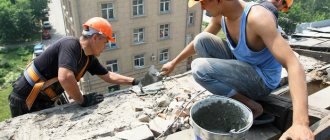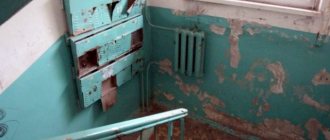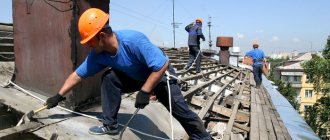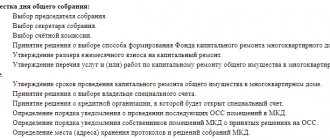From whom is damages recovered in cases involving the gulf?
Cases involving flooding of premises in an apartment building are common in judicial practice.
The cause of flooding is usually associated with careless actions of neighbors above or poor quality maintenance of common property. In the latter case, the person who manages the apartment building is responsible for the damage. In court, the main questions of proof are determining the cause of the flooding of the apartment and on whose property (personal or communal) the accident occurred. Recently, the Supreme Court of the Russian Federation denied a homeowners association, which did not agree with the collection of more than 600 thousand rubles from it. for flooding the office (case No. A12 – 4046/2018).
A homeowners association managed a house in Volgograd; this apartment building contained non-residential premises owned by an entrepreneur. There was an accident on the heating system. As a result, the non-residential premises and the property in them were damaged by hot water. The entrepreneur managed to recover all the damage.
Responsibilities of premises owners
The district court indicated that the common property of the owners of premises in an apartment building includes only those heating elements of the heating system (radiators) and heating system devices that serve more than one apartment (clauses 5 and 6 of Rules No. 491).
The court concluded that in this case, the radiators did not belong to the common property of the owners in the apartment building, because they were installed in specific apartments.
Responsibility to the owners for the proper maintenance of common property in accordance with the legislation of the Russian Federation and the contract lies with management organizations and persons providing services and performing work under the direct management of apartment buildings (clause 42 of Rules No. 491).
As for the owners, they, according to Part 1 of Art. 288 Civil Code of the Russian Federation and Art. 30 of the Housing Code of the Russian Federation, own, use and dispose of the residential premises belonging to them for their purposes, the burden of maintaining these premises is assigned to them. The premises must be maintained in proper condition and mishandling should not be allowed. Owners must also respect the rights and legitimate interests of neighbors, rules for the use of residential premises and rules for maintaining common property.
Damage caused to a citizen’s property is compensated by the person who caused this harm (Article 1064 of the Civil Code of the Russian Federation). The district court reviewed the case and decided that in this case, the owner of the apartment in which everything happened was responsible for the breakdown of the riser.
In this case, the owner did not seek help and approval from either the management company or the contractor, so the court did not see the management organization’s fault in what happened.
Should the management organization erase graffiti from the walls of the house?
222474
Actions of the owner of a flooded premises.
First of all, an inspection report was drawn up, which indicated the cause of the flooding and described the damage caused. The reason was a rupture in the connection between the polypropylene pipe located in the entrepreneur’s office and the metal heating supply pipe; hot water entered the room through a hole in the basement floor slab. As a result of the flooding, floors, suspended ceiling tiles, office furniture, exhibition equipment, and household appliances were damaged.
Next, the entrepreneur organized and paid for an examination to determine the market value of the work and materials needed to restore the damaged property. According to the conclusion, it turned out that the market value of the work and materials is 565 thousand rubles.
The owner wrote a claim to the HOA asking for compensation for the damage, but the HOA refused, citing the fact that the cause of the flooding was improper maintenance of the property owned by the plaintiff.
The entrepreneur had to go to court, which ultimately increased the costs of the HOA.
When is the home builder at fault in the Bay Area?
The developer may be to blame for the flooding of an apartment when a special commission determines that the cause of the flooding was the use of low-quality parts when installing technological and engineering equipment or its incorrect installation. Moreover, these defects were identified during the warranty period, which is established by the contract and cannot be less than three years.
The algorithm of actions is the same as in previous situations: calling the commission of the management company, drawing up a report, sending a claim to the developer demanding compensation for damage. If the developer refuses to settle this issue out of court, you should file a claim in court.
However, it is necessary to take into account the fact that the receipt by the owner of utility networks in poor condition from the developer does not in itself relieve him of liability for damage caused by this property to third parties.
USEFUL : watch a video with advice from a lawyer on conducting a case in court
The court's position.
The court, in addition to the inspection report and the conclusion on the market value of the damaged property, also examined the materials of the State Housing Property Inspection. This inspection took place before the office was flooded, and during the inspection it was determined that the heating system of the built-in non-residential premises located in the basement was classified as common property. Violations in the maintenance of this heating system were identified, and the partnership was even brought to administrative responsibility and ordered to restore the proper technical condition of the pipelines in the basement of the apartment building.
The restoration work was carried out under a contract between the entrepreneur and the HOA - the work was carried out by the HOA. However, after this work, the pipe connection was broken, which, according to the entrepreneur, indicates the “quality” of the work performed by the partnership.
The court ordered an examination. According to her conclusion, the cause of the flooding was a rupture of the connection between the metal-plastic pipe located in the office and the metal heating supply pipe. The reason for the rupture of the pipe connection was poor quality of installation work of the connection (poorly performed crimping of the sleeve during pipe installation). The expert indicated that replacing heating pipes in non-residential premises from metal to metal-plastic and polypropylene did not affect pipe rupture.
The court came to the conclusion that the flooding of the office occurred, among other things, due to improper maintenance of the apartment building by the HOA. They recovered from him 565 thousand rubles of damage, 70 thousand for the services of an appraiser, 15 thousand rubles. for the examination and almost 9 thousand rubles. for state duty.
Responsibility of the management authority for the maintenance of common property
The injured owners filed an appeal, in which they indicated that the burst of the riser did not occur due to repairs, but because the management organization did not properly monitor the heating system.
The owners confirmed their position with the conclusion of an examination, which revealed wear and tear on the pipes. In addition, the owner of the damaged apartment insisted that she could not replace the riser herself, since this could only be done by a management employee with access to the basement where the valves are located.
The regional court sided with the owners. He referred to the Rules for the maintenance of common property in an apartment building, approved by Decree of the Government of the Russian Federation of August 13, 2006 No. 491, and recalled that the heating riser belongs to the common property of the apartment building. The organization managing the house, which did not maintain the common property of the owners of the apartment building premises in proper condition, is responsible for the damage caused.
The management organization established that the heating riser had been replaced, but did not indicate the poor quality of the material, did not record the fact of independent replacement, and did not provide the court with evidence that the owner actually replaced the riser himself.
In addition, the entrance doors to the technical underground and basement must be locked. The keys to them are kept by those who are responsible for the maintenance of the house (clause 3.4.5. Rules of the State Construction Committee of the Russian Federation No. 170).
Based on this, the court concluded that the owners could not replace the heating riser independently, without agreement with the management company and without obtaining free access to communications in the basement of the house. This means that responsibility for damage caused to apartments lies with the management organization.
The HOA's complaints were left unsatisfied.
The HOA appealed the decision to higher courts, citing the need to conduct a re-examination. The Twelfth Arbitration Court of Appeal refused to satisfy the demands, noting that the HOA did not prove the need for a re-examination of the case, and disagreement with the conclusions of the expert report does not in itself entail such a need.
The partnership called for help from the owners of other apartments, who wrote en masse complaints against the court's decision, indicating in them that the judicial act affected their rights; the court illegally burdened them with the maintenance of the entrepreneur's property, establishing the regime of common property for his property.
The court indicated that the owners were not involved in the case; for residents to appeal the decision, it is necessary that the judicial act not only affect their rights and obligations, but was adopted directly about their rights and obligations. The fact that citizens have a simple interest in the outcome of the case does not in itself give them the right to appeal.
The Volga District Arbitration Court also left the HOA's complaint unsatisfied. The Supreme Court of the Russian Federation, in its ruling dated October 1, 2019 No. 306-ES19 – 16143, also refused to transfer the cassation appeal for further consideration, considering the conclusions of the lower authorities correct.
How to identify the culprit behind the flooding of the apartment?
In practice, often no one wants to admit their guilt in flooding an apartment and bear responsibility voluntarily. Given the wide range of possible perpetrators, it is not always possible to sort things out pre-trial.
Despite the fact that a special commission of the management company drew up a corresponding act indicating the reasons and possible culprits, it is not always objective.
Sometimes it is worth bringing in outside experts to conduct an independent assessment of what happened. Or apply in court for a forensic examination. It is worth noting that the court, most often, when making a decision, is based precisely on the conclusions of the expert opinion, and it can find several persons guilty at once (for example, the developer and the owner of the apartment). There are many variations. And in order to get a positive result, you need to carefully prepare for the trial.
Qualified legal assistance when flooding the premises will not be superfluous. An experienced lawyer will be able to develop a competent legal position, protect your rights and interests at all stages of resolving this housing problem, and achieve reasonable amounts of compensation for damage.
Remember
In-house engineering systems are common house property, although the risers are located in the apartments.
The management organization is responsible for the maintenance of common property, regardless of where this property is located.
It is possible to hold the owner responsible for the maintenance of common property only if it can be proven that the damage was caused precisely because of his illegal actions.
Therefore, the MA should be especially careful in the process of proof and collection of evidence.
What work should owners coordinate with the management organization?
Owners of premises in apartment buildings, on the basis of clause 12 of the Rules for the maintenance of common property No. 491, can carry out actions for the maintenance and repair of common property independently, with the involvement of a management organization or contractor.
But there are some works that owners must coordinate with the management authority or neighbors; they are listed in clause 35 of the Rules for the Provision of Public Utilities No. 354. These include:
- making changes to the engineering communications and in-house engineering systems provided for by the project;
- draining coolant from the heating system without the permission of the contractor;
- dismantling or turning off heating elements;
- an increase in the heating surface of heating devices installed in a residential area beyond the parameters provided for in the documentation, etc.
The management organization noted that the owner did not agree with her on the replacement of the riser. But it is the MA that must control their quality, and it is also obliged to regularly inspect all the property that has been entrusted to it.
Cleaning services cannot be listed as a separate line on the receipt.
159757





